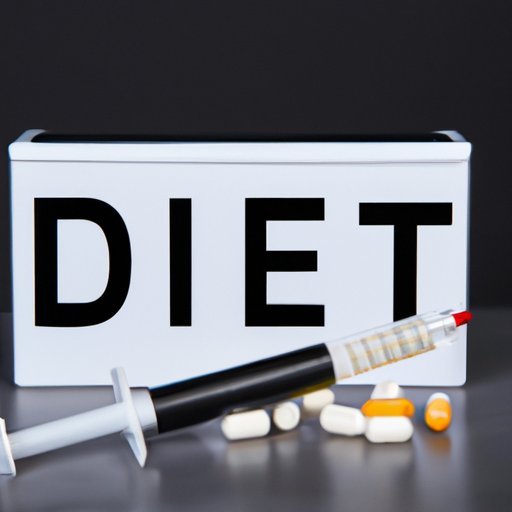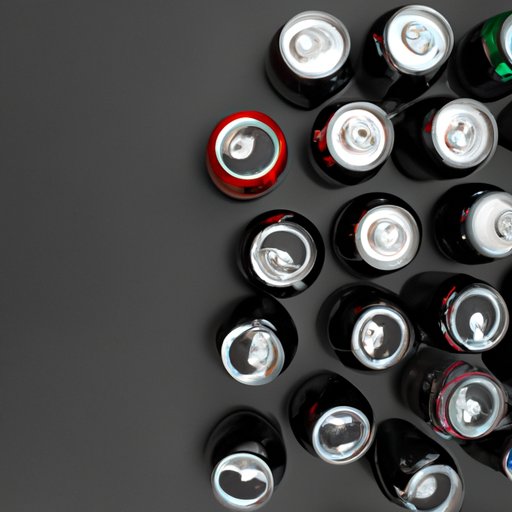
Introduction
If you’re like millions of people around the world, you may have a diet pop habit. These artificially sweetened, low-calorie sodas have become increasingly popular over the years as a supposed healthier alternative to regular soda. But just how healthy is diet pop? In this article, we’ll explore the hidden dangers of diet pop, the addictive nature of this beverage, the potential health concerns associated with its frequent consumption, and the environmental impact of this industry. By the end of this article, we hope to provide you with the knowledge and strategies to make informed and healthful choices about your beverage consumption.
The Hidden Dangers of Diet Pop: What You Need to Know Before Taking Another Sip
First, let’s take a look at the science behind diet pop and its negative effects on health. Although diet pop does not contain the sugar found in regular soda, it often contains artificial sweeteners, such as aspartame, that can lead to weight gain and other negative health outcomes. Studies have linked regular consumption of diet pop to an increased risk of type 2 diabetes, metabolic syndrome, and cardiovascular disease.
But it’s not just the sweeteners that are cause for concern. Diet pop also contains certain additives, such as phosphoric acid, that can lead to weakened bones and even kidney damage. Additionally, the high acidity of diet pop can erode tooth enamel and lead to cavities.
So, what are the potential health concerns associated with frequent consumption of diet pop? In addition to the risks already mentioned, chronic diet pop consumption has been linked to depression and other behavioral disorders, as well as an increased risk of stroke and certain cancers.
Fortunately, there are alternatives to diet pop that can provide better health benefits. Drinking water, almond milk, flavored teas, or natural fruit juices are great options to satisfy your thirst, without all the negative health risks associated with diet pop.
Breaking the Diet Pop Addiction: Tips and Tricks to Kick the Habit
Next, let’s examine the addictive qualities of diet pop and explore practical strategies for reducing consumption. Common causes of addiction to diet pop include the caffeine and sugar substitutes present in this beverage.
If you’re looking to reduce your consumption of diet pop, there are several strategies you can put into practice. For example, gradually reducing the amount of soda you drink each day instead of going cold turkey can be a more effective method. Additionally, consider replacing diet pop with sparkling water, herbal tea, or flavored seltzer, as this can help curtail your soda cravings.
It’s important to remember that everyone’s journey towards reducing or eliminating their diet pop intake is unique and may take time. Take small steps towards success and don’t beat yourself up if you stray from your goals. Celebrate each victory and use others’ success stories as inspiration to continue on your journey.
The Pros and Cons of Diet Pop: Weighing the Benefits and Risks
Now let’s take a closer look at the various benefits and risks associated with diet pop and consider how to make an informed decision about your dietary intake. While diet pop may be a low-calorie option for those watching their waistlines, it comes with its own set of health risks.
In terms of benefits, some studies have shown that drinking diet pop may help weight loss, improve digestion, and lower the risk of developing type 2 diabetes. However, the vast array of negative consequences to your health and the environment far outweigh any potential benefits.
When it comes to making informed choices about the consumption of diet pop, it’s important to consider your individual health status and goals. For example, if you have a family history of diabetes or heart disease, you may want to limit your consumption or switch to an alternative beverage entirely.
Diet Pop Myths Debunked: Separating Fact from Fiction
It’s time to debunk common misconceptions and myths about diet pop. One of the most significant myths associated with diet pop is the belief that it’s a safer alternative to regular soda. This couldn’t be further from the truth. The health risks associated with diet pop far outweigh those of regular soda.
Additionally, some people believe that drinking diet pop does not lead to weight gain. However, studies have shown that artificial sweeteners can lead to weight gain and other negative health outcomes.
The best way to understand the facts and dangers of diet pop is to do your research and stay informed.

The Environmental Impact of Diet Pop: Why Your Soda Habit Is Harming the Planet
It’s not just your health that’s affected by diet pop consumption – the environment takes a significant hit as well. The diet pop industry contributes to increased greenhouse gas emissions and water usage, and the production of plastic bottles contributes to the growing problem of plastic pollution.
One way to reduce the environmental impact of diet pop is to invest in a reusable water bottle and switch to tap water or seltzer water as your primary beverage of choice. Additionally, try to reduce your use of single-use plastics whenever possible. By making these simple changes, we can all make a difference in reducing our carbon footprint.
From Aspartame to Caffeine: The Ingredients in Your Diet Pop and Their Effects on Your Body
Finally, let’s examine the ingredients found in diet pop and their effects on the human body. Common ingredients found in diet pop include aspartame, caffeine, and phosphoric acid, among others.
While these ingredients may be appealing due to their low-calorie or energy-boosting properties, they can have some serious negative effects if consumed in excess. For example, excessive caffeine consumption can lead to jitters, increased heart rate, and trouble sleeping. Aspartame, one of the most common artificial sweeteners found in diet pop, has been linked to a host of negative health outcomes, including neurological damage, migraines, and seizures.
It’s essential to be informed about the ingredients in your food and drink choices and make educated decisions about what’s best for your individual health and well-being.
Conclusion
Overall, the potential negative health and environmental consequences of diet pop far outweigh any benefits. However, everyone has unique goals and health status, so it’s essential to stay informed and make informed choices about your beverage consumption. Whether you choose to reduce your diet pop intake or eliminate it entirely, we hope that this article has provided you with valuable information and practical strategies to make the transition to a healthier, more sustainable lifestyle.





